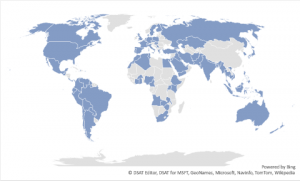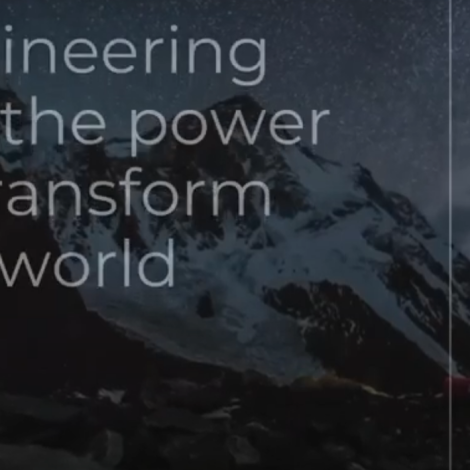See every Impact.Engineered 2020 keynote, panel discussion, breakout group and workshop in this video playlist

Demographic analysis of the registrants for IE2020 show interest in 94 countries among all ages and dozens of professional disciplines.
The decade of action has begun. The mission of the Impact.Engineered 2020 forum and awards was to celebrate the partnerships and forge new relationships that can propel the sector of engineering for global development into a crucial decade. A decade of action. And it really must be a decade of action if we are going to hit near the marks that the Sustainable Development Goals have drawn out. The result was encouraging. The first virtual Impact.Engineered drew more than 1700 registrants from 94 countries, and more than 80 speakers across dozens of sectors.
The wellspring of interest was gratifying, but the numbers were just a backdrop to the presentations that were as inspiring as they were just cause for anxiety. The theme was the urgency of the problems, coupled with the hope that their solutions have support. Speeches and workshops often began with broad strokes illustrating the plight of the world. We face the real danger of failure to meet the SDGs, a climate spiraling into chaos and social, gender and racial inequity that is still institutionalized worldwide in the year 2020. But people have joined in the work toward solutions. People in many sectors and organizations of many sizes, from startups to multinationals and worldclass universities. By celebrating these partnerships, Impact.Engineered 2020 has pointed to the only way forward during the coming decade. This is what we did together.
“We are pragmatic optimists”
Asha Varghese, President of the Caterpillar Foundation, opened Impact.Engineered with a keynote that drew on her Asian American heritage to tell the story of the foundation’s work in underserved communities. Ms. Varghese shared her interpretation of the core principle of Impact.Engineered, “pragmatic optimism.” Her take is that the fullness or emptiness of the glass does not matter as much as what you do with it. She also described the foundation’s funding practices.
“Over time, corporate foundations have gone through an evolution in the way they do business. In the old days, foundations would write checks to many groups and fund their work across a wide range of social endeavors. Today, we are much more focused in our giving, aligning ourselves to not only leverage foundation resources but also company resources, and seeking out partners who share our vision to build more sustainable and resilient communities around the world,” Ms. Varghese says. See her presentation here.
“The question is how quickly we can adapt”
We can all imagine ways that technological innovation can support the SDGs, but most of us working in engineering for global development are on the outside, says Jenny Frankel-Reed, Climate Adaptation Advisor with the Bill and Melinda Gates Foundation, in closing remarks at Impact.Engineered. We rely on local partners to identify what’s valuable and what could work, she says.
We face an enormous adaptation challenge as the world heads toward 1.5C warmer climate by 2040. We can reduce our vulnerability. The question is how quickly we can adapt, and can everyone do it.
Jenny Frankel-Reed @gatesfoundation #IE2020— Engineering for Change (@engineer4change) December 4, 2020
And the winner is…
An international panel of expert judges awarded four thought leaders for their contributions toward technology that meets basic needs in underserved communities. And the online community chose one Rising Star. These are the award winners at Impact.Engineered.
Women Leading in Technology and Impact: Dyan Gibbens, Founder and CEO of Trumbull Unmanned, providers of robotics solutions.
Connecting the Unconnected: Digiduka, Digital & Financial services for small businesses in Africa.
Hardware Trailblazer: New Leaf Dynamic Technologies, creator of biomass-powered refrigeration systems and winner of ASME’s ISHOW 2015 in India.
Industry Driving Social Impact: Black & Veatch Corporation, an employee-owned engineering firm.
Rising Star: Hydroquo+, creator of hydrometric information systems for the water industry.
For more on the award winners please see impact-engineered.org.
“Not even moving in the right direction”
Progress on the Sustainable Development Goals has slowed, says Astra Bonini, Senior Sustainable Development Officer for the United Nations Department of Economic and Social Affairs. In her address on the state of the SDGs, Ms. Bonini disclosed findings from progress reports suggesting that poverty reduction has slowed and hunger has seen slight upticks. “Trends in several other areas are not even moving in the right direction,” Ms. Bonini says. Those include inequality reduction, reversing biodiversity loss and climate change. The COVID-19 pandemic has taken its toll on progress to meet the goals. Estimates of the pandemic’s impact are “sobering,” Ms. Bonini says. One hundred million people could be pushed back into extreme poverty in 2020, becoming the first increase in global poverty in more than 20 years. Food insecurity and acute hunger could double, and education and gender equality are suffering under lockdowns.
The world’s response to the pandemic, however, offer an opportunity to make deep structural changes in energy, food and economic systems, Ms. Bonini says. This is her address.
Virus safety in architecture
Thought leaders in the public and private sectors analyzed the implications of delivering the 2030 Agenda in a time of crisis. The first panel, Ecosystems for Social Impact, included Rebeca Moreno Jimenez, UNHCR Innovation Officer and Data Scientist, Myong Hwa Lee, Head Office of the National Science and Technology Policy Institute (STEPI) of the Republic of Korea, Michael McWhirter, VP at Stantec.
How is architecture & building design keeping us safe during the #pandemic ? Redesign to improve #HVAC systems, outdoor spaces and add wastewater sampling as a warning system for outbreaks – Michael McWhirter, VP @Stantec #IE2020
— Engineering for Change (@engineer4change) December 3, 2020
“2020 will go down in history as a year when we were all called to action”
Victor Konde, Science Affairs Officer, at the UN Economic Commission for Africa analyzed Africa’s COVID-19 response.
Note to entrepreneurs: set goals and measure impact
Carly Gallo and Rachel Brophy at The Resolution Project challenge entrepreneurs to find tools for setting goals and measuring impact.
@resolutionproj session takes on a hands on approach in which they ask the participants to come up with a draft of a logic model. Rather than just theory, they emphasize establishing the process. #IE2020
— Engineering for Change (@engineer4change) December 3, 2020
“Large companies can pressure suppliers for more sustainable outcomes”
The Engineering for Change Research Fellows shared findings from their research in collaboration with partner organizations and businesses. These are their insights.
#E4CFellow Danna Xue says “we found that B2B interactions are particularly important for driving sustainability initiatives in D&M. Large companies have a lot of leverage over their suppliers and can pressure them to aim for more sustainable outcomes.” #IE2020
— Engineering for Change (@engineer4change) December 3, 2020
“We have to do a much better job at collaboration”
Engineering societies are prioritizing sustainability at a higher level than ever before, according to a panel that convened Iana Aranda, E4C’s President; Mark Abbott, Executive Director of Engineering Change Lab – Canada; Michael Johnson, Chief Strategy Officer for the American Society of Mechanical Engineers; William Kelly, Chair of the Global Sustainability Task Committee for the American Association of Engineering; Kathy Land. President Elect of the Institute for Electrical and Electronics Engineers.
“I think that we have to do a much better job at collaboration. Particularly, as engineering’s changing and becoming a more multidisciplinary activity, we have to come together in some kind of forum and drive collaboration.” – Michael Johnson. #IE2020
— ASME.org (@ASMEdotorg) December 3, 2020
These have been just a few of the highlights. Please see the presentations, workshops and awards ceremony in this video playlist: Impact.Engineered 2020.


This event was largely vapid, pro-corporate unsustainable globalism. Speakers failed to acknowledge that for poor countries to grow their economies to attain a basic, humane standard of living, degrowth in over-consuming rich countries is required. That is what the science says – stop denying it.
The conference was mainly by and for engineers, yet the ideology promoted – that endless growth on a finite planet is the panacea for all social and environmental ills – is blatantly unscientific and violates the introductory lessons in energy and mass balance we teach to college sophomores.
All this “happy talk” about innovation, efficiency, “green tech,” etc. puts lives in danger. Not the lives of privileged conference attendees (perversely, it boosts our careers), but the lives of poor mostly non-white people around the world. It’s irresponsible and we need to stop it and get serious about accurately describing the risks of status quo un-sustainability and devise strategies for downshifting.
Please do better, E4C.
Comments are being censored.
I’ll respond to this because you and I have worked together and respect your opinion. Your criticism goes too far, in this case. My colleagues who organized the event worked for several months to bring in a diverse range of perspectives and I think they succeeded. The event had some corporate foundations represented, sure, and it had representatives of NGOs, non-profits, social startups and academia. I wouldn’t have wanted to exclude the corporate foundations or their perspective because of an ideological bias that some attendees might hold.
Also, I don’t think anybody denied the idea that reducing consumption might be necessary in richer countries. It just didn’t come up, as far as I remember. I think a lot of people would agree with that idea, actually. The implication of censorship is confusing given your history with E4C. I’ve published your articles on our site, and you’re welcome to continue writing for us. I’ve been impressed with your analysis and so have my colleagues.
The event wasn’t perfect, but it was good. Lots of people volunteered their time to pull this off. It didn’t include every opinion, but that wouldn’t that have been possible, anyway. Anyway, I hope you’ll reconsider your criticism.
Editing this comment to add that we’d love to include your views in next year’s event if you’d like to help organize a panel discussion. If interested, please write impact_engineered@asme.org.
Didn’t see the comment notifications, sorry! See above! Wait, no, I mean below! (Just saw how it looks on the page.)